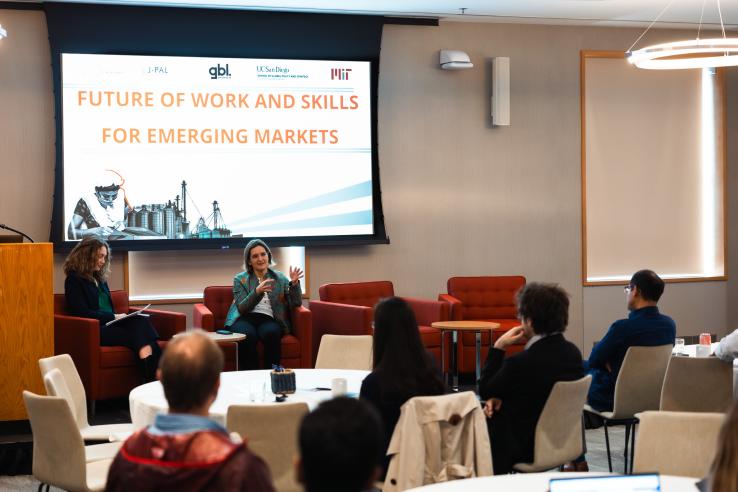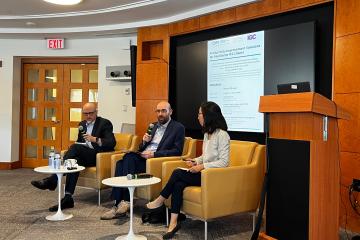
The private sector’s role in worker well-being, sustainability, and inclusive growth: Reflections from researchers and businesses

What is the role of the private sector in improving the lives and livelihood conditions of workers in lower- and middle-income countries (LMICs)? How can we empower LMIC-based entrepreneurs to develop successful and sustainable businesses? And what are the potential benefits for businesses from partnering with researchers to evaluate evidence-informed solutions for social impact? These were the key questions central to a recent gathering of academic researchers, business leaders, and development practitioners at MIT, co-hosted by the J-PAL’s Firms sector, the Good Business Lab, and University of California, San Diego’s 21st Century India Center.
In recent years, there has been a growing focus on the role of businesses in achieving social objectives and offering higher-quality employment opportunities to workers in LMICs, with the ultimate goal of reducing poverty. Anchored by a keynote dialogue with J-PAL Co-Founder and Director Esther Duflo (MIT), the full-day event, Future of Work and Skills for Emerging Markets, aimed to boost evidence-use in the private sector for effective social impact programs.
The event centered on three key themes:
- enhancing workers’ skill sets, including soft skills,
- accelerating women's economic empowerment across employment and entrepreneurship settings, and
- promoting sustainability and entrepreneurship through supply chain relationships.
Across these themes, the event urged businesses and stakeholders to adopt evidence-based practices, fostering a future where informed decisions drive both social impact and business success.
What evidence can we share on how to unite worker welfare and business growth?
In her keynote dialogue, Esther Duflo noted that “the priority of the private sector is to run their business, like hiring people and producing goods that people want to buy…but there are so many opportunities to do things much better.” Indeed, business outcomes can often overshadow the needs of workers. Some firms might hold the view that practices that enhance worker well-being come at the cost of growth or profitability. Or, as Esther added, they might falsely believe that “if something should be done, then it would already have been done,” and miss out on opportunities to improve. However, work by J-PAL affiliated researchers and the Good Business Lab are illuminating how to potentially unite the two objectives of worker welfare and business health.
An early example comes from India, where researchers randomly offered a soft skills training program to female garment line workers. The workers who received the program demonstrated an increase in soft skills such as sociability and likelihood of requesting further skill development trainings, relative to those who did not. They were also more likely to earn a promotion. Meanwhile, the productivity of the lines they worked on increased such that the returns to the program for the manufacturer amounted to 258 percent nearly two years after its end. These results suggest that it can be worthwhile for firms to invest in the upskilling of their workers. Improvements in soft skills, which are basic human skills that can improve employment outcomes for job-seekers and, as J.D. Giri (vice president at Shahi Exports where the trainings took place) observed, can complement hard skills to make an employee successful once hired.
In addition to upskilling their workers, firms also have opportunities to empower the voice of workers. For example, letting automobile factory workers in China provide anonymous feedback on their managers led to lower turnover and higher morale, all while increasing team-level productivity. However, worker empowerment is especially salient for women. As Claudia Martínez A., lead economist at the Inter-American Development Bank, noted, women face unique challenges in the workplace, such as gender-based violence and the need to devote time to childcare in many contexts. J-PAL affiliated researchers have found that secure survey designs, which can help alleviate the fear of retaliation that many women face when choosing whether to report harassment or not, substantially increased the number of complaints filed within a Bangladeshi garment manufacturer. A recent review of several studies also revealed positive impacts of access to various types of childcare support for women, such as enabling them to be more productive by not having to bring their child to work anymore.
The role of firms however, is not limited to their own factory floors and workforce. Large firms also have an important role to play in improving environmental and social sustainability through their supply chain relationships. Chris Mejía Argueta and Josué C. Velázquez Martínez, research scientists at the MIT Center for Transportation Logistics, shared examples of how innovative sourcing practices by global food and beverage brands, new AI-assisted tools, and other interventions increased productivity among the popular retail microenterprises in Latin America and reduced their carbon footprint. In other sessions, speakers discussed the state of evidence and identified key areas for empowering women informal entrepreneurs and partnerships for evidence-based action in the private sector.
While these studies offer promising ways to unite social and business objectives, wider adoption is needed. Business practices can be improved by using scientific evidence on which ones work, are worth investing in, and should be scaled up. Large multinational companies and LMIC-based firms stand alike to gain from such informed decision-making. Evidence can also quantify the link between responsible and sustainable business practices and higher productivity, and thus bolster the business case for the adoption of these practices.
The need for evidence-informed decision-making in the private sector, and for future collaborations between researchers and businesses
At the close of the event, co-founder of the Good Business Lab and J-PAL affiliated professor Anant Nyshadham (University of Michigan) reflected that “we want to move firms away from viewing workers as balance sheet liabilities, and more toward human assets to invest in, who are truly part of the organization.”
The event presented attendees with several open questions to consider, many of which challenged attendees to think about how to take advantage of emerging technologies and greater capacities in data collection. For example, how can we leverage digital tools to engage workers? And how can these digital tools help firms and researchers quantify the impacts of new solutions? In his closing statements, J-PAL affiliate and Firms sector co-chair David Atkin (MIT) remarked, “It sounds like a no-brainer, that everyone should be doing evidence-based decision-making, but it’s really not how most decisions are made. With all this data that’s coming online…we should be doing a lot more evidence-based decision-making.”
He further captured the many low-hanging fruits that came up throughout the day, which firms could adopt to raise profits and productivity while also serving social goals:
- Upskilling and soft skills training
- Digital record keeping and tools to bring transparency to supply chains, strengthening worker voice, and inform decision making
- Boosting women’s health, empowerment, and entrepreneurship
- Improving energy efficiency in supply chains to lower costs
- Leveraging global value chains to raise labor standards and environmental sustainability
Through a commitment to evidence-based practices, coupled with the integration of emerging technologies, businesses can navigate a future where sustainable growth aligns with the well-being of workers.
We encourage businesses or partners interested in learning more about impact evaluations to reach out to Julie Cobill, environmental, social, and governance lead at J-PAL at [email protected] or GBL at [email protected].
Related Content

Winners and Losers: The Benefits and Dangers of Credit

Shaping the right incentives for firms to facilitate climate adaptation and improve environmental quality
